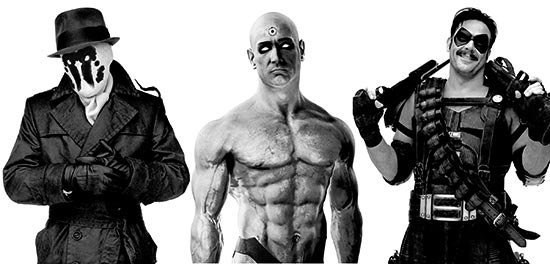BitDepth 671 - March 17
16/03/09 21:53 Filed in: BitDepth - March 2009
Watchmen proves eminently watchable.
Watching Watchmen

Watchable. Jackie Earle Haley as the demented Rorschach, Billy Crudup rendered as 3D special effects, complete with dangling blue junk and Jeffrey Dean Morgan's enthusiastically bloodthirsty Comedian.
After the considerable buzz and even more overwhelming discussions about Zack Snyder's film adaptation of the graphic novel Watchmen, it's almost a relief to declare it neither the stuffy reproduction that its worst critics have claimed it to be, nor is it likely to be the unequivocal success that Warner Brothers was hoping for.
Young Snyder, the bearded Turk who scored rock riffs to Frank Miller's über-macho retelling of the Spartan legend of desperate resistance to Persian assault, was always in the position in this production of a young, film-making Alexander rolling into Gordium.
The skeins that author Alan Moore wove together in the 1986 comic he created with artist Dave Gibbons were as light on plot as it they were dense with characterisation and storytelling. As with the young Alexander, the only solution to this intricately tied knot of story was to cut and the film is better when Snyder does so intelligently.
Fans of the book will feel the loss of the Hollis Mason story and wince at the abrupt truncation of the backstories of the rivetingly psychotic Rorschach (Jackie Earle Haley) and the persuasively otherworldly Dr Manhattan (Billy Crudup).
These two stories form the heart of the original graphic novel, each character's tale given a full chapter of the twelve that made up the book and the richness of each is full of the kind of character detail that there's simply no room for in a movie that clocks in just shy of three hours long.
Out of the four colour pages
Like the book, the film is a work of science fiction alternative history, offering a world in which costumed characters left the pages of comic books in the 1940's to make their shaky way into "reality," battling crooks and unsettling the general public.
In 1959, an atomic superman is born in one of those terrible accidents that comics make so appealing. Jon Osterman figures out how to reassemble his scattered atoms and in doing so, returns to the world in control of all matter and a fetching shade of blue.
His presence proves to be the ultimate prompt for nuclear escalation and the mad race of nuclear proliferation runs wildly out of control.
The costumed heroes annoy the police, who strike in protest, and the government steps in, outlawing "masks." Except for the convenient ones, like Manhattan and The Comedian, a savage killer who aligns his star with authority and whose murder opens the story.
The curious appeal of Rorschach as both character and narrator makes the transition readily to the screen. If you can buy this grimy, weirdly moralistic character as the centrepiece of the story, everything else flows outward from that. Haley's performance in the role is committed and sincere, an enthusiastic sales pitch that buoys the venality of Jeffrey Dean Morgan's assaying of The Comedian and contrasts with the liberal flip-flopping of Nite Owl (Patrick Wilson).
Meanwhile...
As a film, Watchmen takes flight most convincingly when it references the book without reproducing it. The remarkable title sequence summarises circumstances of this alternative history effectively, while the war room sequences make amusing reference to Kubrick's Dr Strangelove.
Music plays a big part in Moore's story, and oddly enough for a silent medium, his references create a soundtrack for the reader that's very much a part of the tale. Some changes to the music are inspired in the film, like the use of Ride of the Valkyries in the Vietnam sequence, staged to look like a superhero version of Apocalypse Now. Other changes are more iffy. "The times they are a changing" seems a lazy choice for the opening credits, while the Jimi Hendrix reading of "All along the watchtower" flounders in a sequence of cuts at the conclusion of the film that fail to make sense of the reason it exists in the book.
The obsessive commitment to the details of the book lead Snyder and his screenwriters to underplay the best twist of the story by staying true to the serenity of Ozymandias, played by a suitably effete Matthew Goode, who engineers a wrenching plot twist worthy of Sixth Sense treatment on film.
Ultimately, Watchmen is a greater success as a treasure trove for fans of the book than as a standalone work of storytelling. It's just interesting enough to survive without the backstory that two decades worth of Watchmen readers will bring to the cinema, but it packs a lot more of that detritus in than casual viewers might want to see.
Related: On Watchmen, Who watched Watchmen?

Watchable. Jackie Earle Haley as the demented Rorschach, Billy Crudup rendered as 3D special effects, complete with dangling blue junk and Jeffrey Dean Morgan's enthusiastically bloodthirsty Comedian.
After the considerable buzz and even more overwhelming discussions about Zack Snyder's film adaptation of the graphic novel Watchmen, it's almost a relief to declare it neither the stuffy reproduction that its worst critics have claimed it to be, nor is it likely to be the unequivocal success that Warner Brothers was hoping for.
Young Snyder, the bearded Turk who scored rock riffs to Frank Miller's über-macho retelling of the Spartan legend of desperate resistance to Persian assault, was always in the position in this production of a young, film-making Alexander rolling into Gordium.
The skeins that author Alan Moore wove together in the 1986 comic he created with artist Dave Gibbons were as light on plot as it they were dense with characterisation and storytelling. As with the young Alexander, the only solution to this intricately tied knot of story was to cut and the film is better when Snyder does so intelligently.
Fans of the book will feel the loss of the Hollis Mason story and wince at the abrupt truncation of the backstories of the rivetingly psychotic Rorschach (Jackie Earle Haley) and the persuasively otherworldly Dr Manhattan (Billy Crudup).
These two stories form the heart of the original graphic novel, each character's tale given a full chapter of the twelve that made up the book and the richness of each is full of the kind of character detail that there's simply no room for in a movie that clocks in just shy of three hours long.
Out of the four colour pages
Like the book, the film is a work of science fiction alternative history, offering a world in which costumed characters left the pages of comic books in the 1940's to make their shaky way into "reality," battling crooks and unsettling the general public.
In 1959, an atomic superman is born in one of those terrible accidents that comics make so appealing. Jon Osterman figures out how to reassemble his scattered atoms and in doing so, returns to the world in control of all matter and a fetching shade of blue.
His presence proves to be the ultimate prompt for nuclear escalation and the mad race of nuclear proliferation runs wildly out of control.
The costumed heroes annoy the police, who strike in protest, and the government steps in, outlawing "masks." Except for the convenient ones, like Manhattan and The Comedian, a savage killer who aligns his star with authority and whose murder opens the story.
The curious appeal of Rorschach as both character and narrator makes the transition readily to the screen. If you can buy this grimy, weirdly moralistic character as the centrepiece of the story, everything else flows outward from that. Haley's performance in the role is committed and sincere, an enthusiastic sales pitch that buoys the venality of Jeffrey Dean Morgan's assaying of The Comedian and contrasts with the liberal flip-flopping of Nite Owl (Patrick Wilson).
Meanwhile...
As a film, Watchmen takes flight most convincingly when it references the book without reproducing it. The remarkable title sequence summarises circumstances of this alternative history effectively, while the war room sequences make amusing reference to Kubrick's Dr Strangelove.
Music plays a big part in Moore's story, and oddly enough for a silent medium, his references create a soundtrack for the reader that's very much a part of the tale. Some changes to the music are inspired in the film, like the use of Ride of the Valkyries in the Vietnam sequence, staged to look like a superhero version of Apocalypse Now. Other changes are more iffy. "The times they are a changing" seems a lazy choice for the opening credits, while the Jimi Hendrix reading of "All along the watchtower" flounders in a sequence of cuts at the conclusion of the film that fail to make sense of the reason it exists in the book.
The obsessive commitment to the details of the book lead Snyder and his screenwriters to underplay the best twist of the story by staying true to the serenity of Ozymandias, played by a suitably effete Matthew Goode, who engineers a wrenching plot twist worthy of Sixth Sense treatment on film.
Ultimately, Watchmen is a greater success as a treasure trove for fans of the book than as a standalone work of storytelling. It's just interesting enough to survive without the backstory that two decades worth of Watchmen readers will bring to the cinema, but it packs a lot more of that detritus in than casual viewers might want to see.
Related: On Watchmen, Who watched Watchmen?
blog comments powered by Disqus

